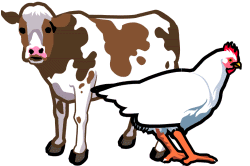


“You shall not cook a kid in its mother’s milk” (Ex 23:19)
The word “kosher” means “fit” or “proper”. It means that something is OK to eat. The laws of Kashrut (dietary laws) come from the Torah and were added to over time by rabbis who made them clearer so people could follow them in everyday life.
The laws of Kashrut are complex and many branches of Judaism have their own interpretation of the various laws. This is just a simple guide of the basic laws. For more information on the details consult your local rabbi.
Many people ask: “Do you think HaShem cares what we eat?” What they are asking is really “Do you think HaShem cares?” HaShem cares for you as a person and would like you to follow the laws of the Torah so that you can be the best person you can be.
The Torah forbids the cooking of meat and milk together. As a safeguard, rabbis have extended this idea so that meat and milk are not served at the same meal. This prevents accidents, and even the appearance of breaking kashrut. The utensils and dishes that they are served on are also separated.



Things to remember when starting a Kosher home
- There should be nothing in it that is non-kosher.
- Meat and dairy products and utensils need to be separate. There is one set of dishes and utensils for meat and one for dairy. Many families have two other sets which are used only during Passover.
- Parve food cooked in a meat or milk pot or pan becomes milk or meat and must be served at the appropriate type meal.
- Drinking glasses can be used with either meal as long as they are washed.
- Separate sponges and dish towels are kept for meat and dairy.
- Separate sink racks and sink receptacles should be used for meat and dairy as well as separate drying racks.
Kosher wines
Wine, grape juice and grape products such as grape jelly should, in the Orthodox view, be supervised and given a rabbinic stamp if it is kosher. The ruling comes from the Talmud and says that Jews should not drink wine touched by non-Jews, because it could have been intended for idol worshipers. The conservative movement says that for the most part in America wine is made by automation and no one “handles” the wine and it is therefore OK.
Note: If you have doubts or concerns about Kashrut consult your local rabbi as customs vary.

